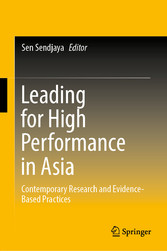Search and Find
Service
More of the content

Leading for High Performance in Asia - Contemporary Research and Evidence-Based Practices
Preface
5
Contents
7
1 Fostering Organisational Citizenship Behaviour in Asia: The Mediating Roles of Trust and Job Satisfaction
9
1.1 Introduction
9
1.2 Theory and Hypothesis Development
10
1.2.1 Servant Leadership and Organizational Citizenship Behavior
10
1.2.2 The Mediating Role of Trust
11
1.2.3 The Mediating Role of Job Satisfaction
12
1.2.4 Contexts of the Study
13
1.3 Method
14
1.3.1 Samples
14
1.3.2 Measures
15
1.3.3 Method of Analysis
15
1.4 Results
16
1.4.1 Hypotheses Testing
16
1.5 Discussion
19
1.5.1 Managerial Relevance
20
1.5.2 Limitations and Future Directions
21
References
22
2 Transformational Leadership and Follower Citizenship Behavior: The Roles of Paternalism and Institutional Collectivism
27
2.1 Theory and Hypothesis Development
29
2.1.1 Transformational Leadership and Follower Citizenship Behavior
29
2.1.2 The Mediating Role of Paternalism
30
2.1.3 The Moderating Role of Institutional Collectivism
32
2.2 Methods
33
2.2.1 Sample and Procedures
33
2.2.2 Measures
34
2.2.3 Analytical Strategy
36
2.3 Results
36
2.3.1 Hypothesis Tests
38
2.4 Discussion
40
2.4.1 Theoretical Contributions
41
2.4.2 Managerial Implications
42
2.4.3 Strengths, Limitations, and Future Research
42
References
43
3 Contact Employees’ Prosocial Behaviors: The Role of Leader-Member Exchange and Perceived Organizational Support
49
3.1 Introduction
49
3.2 Theoretical Background
52
3.3 Methodology
56
3.3.1 Procedures
56
3.3.2 Participants
56
3.3.3 Measures
57
3.4 Results
58
3.4.1 Descriptive Statistics
58
3.5 Confirmatory Factor Analysis
59
3.6 Structural Analysis and Hypotheses Testing
60
3.7 Discussion
61
3.8 Strengths, Limitations, and Future Research
65
3.9 Managerial Implications
66
References
68
4 The Construction of Positive Leader Identity: Acquiring a Leadership Position and Being Accepted by Others
72
4.1 Introduction
73
4.2 Positive Leader Identity Construction Through the Claiming and Granting Mechanism
74
4.2.1 Positive Leader Identity
74
4.2.2 Leadership Self-efficacy
75
4.2.3 Leader Group Prototypicality
76
4.2.4 Leader Endorsement
77
4.2.5 Leader Group-Oriented Behavior
78
4.3 Methods
79
4.3.1 Procedure and Sample
79
4.3.2 Measures
80
4.4 Positive Leader Identity
81
4.5 Leadership Self-efficacy
81
4.6 Leader Group Prototypicality
81
4.7 Leader Endorsement
81
4.8 Leader Group-Oriented Behavior
81
4.8.1 Control Variables
82
4.9 Results
82
4.10 Discussions
85
4.10.1 Research Findings
85
4.10.2 Limitations
87
4.11 Managerial Implication
87
4.11.1 Enhancing Leader Identity Claim
88
4.11.2 Displaying Group-Oriented Behavior
89
4.11.3 Cultivating an Open and Employee-Empowering Culture
90
4.12 Conclusions
90
References
91
5 Career Sponsorship: An Effective Way for Developing Women Leaders
96
5.1 Introduction
96
5.2 Career Sponsorship as a Leadership Development Strategy?
98
5.3 Research Methodology
99
5.3.1 Autoethnography
100
5.3.2 Case Study Research
101
5.4 Results
103
5.4.1 Results from the Autoethnography
103
5.4.2 Results from the Case Study Research
104
5.5 Discussion
107
5.6 Contribution to Theory
109
5.7 Implications to Practice
109
5.8 Limitations
109
5.9 Conclusion
110
Appendix 1—List of all the Behaviors of the Sponsor
110
References
110
6 Examining Servant Leadership Effects on Team Satisfaction: An Agent-Based Approach
113
6.1 Introduction
113
6.2 Team Work, Interdependence and Team Effectiveness
114
6.3 Servant Leadership
117
6.4 Leadership and Team Performance
118
6.5 Agent Based Approach for Modelling Complexity
120
6.6 The Proposed Agent-Based Model
121
6.7 Experimental Design and Computer Simulation
124
6.8 Simulation Results and Discussion
128
6.8.1 Validity
128
6.8.2 Emerging Patterns
129
6.9 Managerial Implication
131
6.10 Conclusion
132
References
133
7 Social Exchange or Social Learning: A Theoretical Fork in Road for Servant Leadership Researchers
138
7.1 Servant Leadership
139
7.2 Servant Leadership in an Asian Context
141
7.3 Social Learning Theory
142
7.4 Servant Leadership and Social Learning Theory
144
7.5 Social Exchange Theory
148
7.6 Servant Leadership and Social Exchange Theory
149
7.7 Looking at These Two Theoretical Pathways Concurrently
150
7.8 Future Research Direction
157
7.9 Implications for Managers
158
7.10 Conclusion
159
References
160
8 Looking Back to Look Forward: Lessons for Leadership Development
164
8.1 Introduction
164
8.2 Leadership Development
166
8.3 Approaches to Leadership Development
168
8.4 Transformational Leadership and Leadership Development
169
8.5 Servant Leadership and Leadership Development
170
8.6 Transformational and Servant Leadership
172
8.7 The Study
173
8.8 Methodology
173
8.9 Results and Discussion
175
8.10 Voluntary Subordination
176
8.11 Authentic Self
177
8.12 Covenantal Relationship
178
8.13 Responsible Morality
178
8.14 Transcendent Spirituality
179
8.15 Transforming Influence
180
8.16 Theoretical and Practical Contributions
181
8.17 Limitations and Future Research Directions
182
References
183
9 ‘Pergumulan’ as the Starter and Sustainer of Servant Leadership: A Case of Academic Leadership in an Indonesian Private University
190
9.1 Changes and Servant Leadership
191
9.2 The Servant Leadership Case
193
9.3 Methodology
196
9.4 ‘Pergumulan’
197
9.5 Pergumulan as the Starter of Servant Leadership
197
9.6 Pergumulan as the Sustainer of Servant Leadership
200
9.7 Conclusion and Recommendation
202
References
203
All prices incl. VAT












